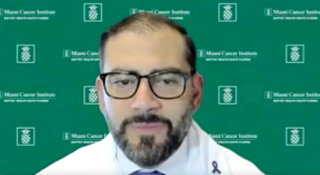
Surgery
Latest News
Latest Videos

CME Content
More News

Surgical oncologists from Cleveland Clinic discuss the National Accreditation Program for Rectal Cancer and its aim to improve patient outcomes.

Treatment with complete mesocolic excision appears to reduce the length of hospital stay compared with conventional surgery in right colon cancer.

Findings may support bilateral mastectomy as an alternative for symmetry following unilateral mastectomy for breast cancer.

Investigators aim to identify a clinically useful and safe dose of Illuminare-1 for future studies in surgical cancer care.

Patients with cancer who underwent surgery during the COVID-19 pandemic were also more likely to have respiratory complications.

Gregory Charak, MD, discusses how modalities like laparoscopic surgery and neoadjuvant immunotherapy may benefit patients with colorectal cancer.

Immunotherapy may be an “elegant” method of managing colorectal cancer, says Gregory Charak, MD.

Timothy Chen, MD, highlights how technologies such as ZAP-X and proton therapy may improve outcomes for patients with cancer.

Administering neoadjuvant therapy to patients with colorectal cancer may help surgical oncologists attain a negative-margin resection.

Laparoscopy may reduce the degree of pain or length of hospital stay compared with open surgery for patients with colorectal cancer.

Roshni Rao, MD, FACS, discussed the use of neoadjuvant chemoimmunotherapy and its complications in the treatment of patients with triple-negative breast cancer.

DCISionRT is a risk-assessment test for patients designed to predict RT benefit and develop their recurrence risk after surgery alone or with radiation.

Richard Lazzaro, MD, discusses how a robot-assisted platform has impacted his thoracic surgery and highlights other potential advancements in the field.

ZAP-X may provide submillimeter accuracy when administering radiation to patients with brain tumors.

The latest KEYNOTE-756 data highlight the surgical outcomes of patients with high-risk early-stage estrogen receptor–positive breast cancer.

In clinically node-positive breast cancer, clipping of lymph nodes may induce higher rates of sentinel lymph node surgery after neoadjuvant chemotherapy.

Results from the INSITE trial support the utility of pegulicianine fluorescence-guided surgery during breast cancer surgery.

Those aged 18 to 40 years with invasive, HER2-positive breast cancer showed a survival benefit from upfront surgery over neoadjuvant chemotherapy.

Patients who are African American appeared to have worse clinical stages of colon and rectal cancer during surgery in 2020.

The recent Hot Topics section focuses on survival rates for patients with cholangiocarcinoma.

Experts discuss findings related to gastrointestinal cancer outcomes as well as treatment inequalities presented at the 2024 SSO Annual Meeting.

Microwave ablation may be a go-to treatment option instead of surgery for patients with multifocal T1N0M0 papillary thyroid cancer.

Oncologic outcomes from a real-world analysis appear to be comparable with those observed in the sentinel lymph node biopsy arm of the SOUND trial.

The National Accreditation Program for Breast Centers looked at time intervals to see where delays occurred throughout the process for those with breast cancer.

Young patients with breast cancer were more likely to be the reason for diagnostic delays vs system delays, partly due to less concern for their symptoms.










































